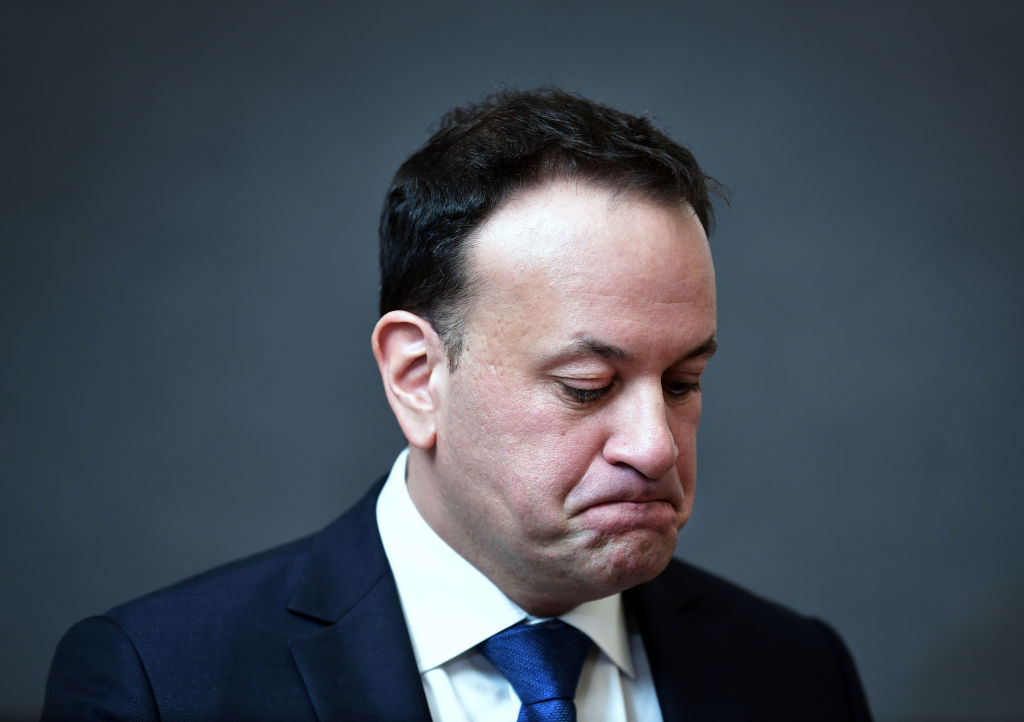Enoch Powell observed that “all political lives, unless they are cut off in midstream at a happy juncture, end in failure.” There was no such happy cut-off for Leo Varadkar, who today announced his resignation as Taoiseach and leader of Fine Gael.
Earlier this month, his government suffered two humiliating defeats in referendums to change the Irish constitution’s definition of the family and language on the role of women.
Despite almost the entire political class lining up behind a Yes/Yes vote and polls suggesting comfortable majorities in favour of change, in the event Irish voters rejected both amendments by wide margins and on a respectable turnout.
It can plausibly be argued that Varadkar made this rod for his own back. The successful No campaigns focused on the lack of clarity from ministers about the impact of the new terminology on a wide range of matters from inheritance to immigration.
This danger had been flagged to ministers. But instead of taking the time to iron out the question, the Irish government pressed ahead with rushed proposals — with disastrous results.
Perhaps the overwhelming support of Dublin’s political class blinded policymakers to the danger of how the new wording would be received in the country. Perhaps, too, the symbolism of holding the vote on International Women’s Day (and the impact this might have on the outcome) proved too tempting to resist.
But a cynic might also note that this year’s European elections are coming up in June; the timing of Varadkar’s departure may well have at least something to do with ensuring that he’s free to take up a new role in Brussels, the standard career trajectory for many politicians after leaving office.
His decision to push ahead with the referendum may thus have been dictated in part by the desire to bolster his legacy with a last big, progressive achievement.
If so, Varadkar should have paid closer attention to Nicola Sturgeon, whose own departure was precipitated by a similar scramble to pass her controversial Gender Recognition Reform (GRR) Bill — teeing up a confrontation in which the British Government could, for the first time, wield its veto without provoking Scottish voters.
Taking a longer view, history will probably come to view Varadkar’s premierships through the lens of two issues: Brexit, and the relentless advance of Sinn Féin.
His maximalist approach to Northern Ireland since 2016, insisting that there could be no border at all with the Republic, was doubtless at least partly driven by the growing strength of the republican party in the latter’s politics.
The long-term impact of this remains to be seen. But with Ireland still a long way from being willing or able to shoulder the burdens of annexing its northern neighbour, his praying in aid of the Belfast Agreement in pursuit of a policy far beyond its terms may come back to haunt policymakers on both sides of the Irish Sea.
Meanwhile, it was under Varadkar that Fine Gael took the seismic step of entering coalition with Fianna Fáil, historically Ireland’s dominant party. Until 2020, these were Ireland’s two principal parties of government (Fine Gael usually governing with Labour).
Yet after months of stalemate following the 2020 election, the two were forced to share office, along with the Greens. While this kept Sinn Féin out in the short term, it means both now own the failures of government, creating fertile territory for the republicans.
Last week, the Dublin establishment got lucky. Sinn Féin may venerate terrorists but the party is not full of classical populists either, lining up with the other parties on the referendum and on other hot-button issues such as immigration.
Sinn Féin may yet grow more willing to abandon select progressive shibboleths — or another party might arise in the space it refuses to occupy. Then, the self-consciously modernising Varadkar may come to appear instead as part of the Irish establishment’s long rearguard against much less welcome change.











Join the discussion
Join like minded readers that support our journalism by becoming a paid subscriber
To join the discussion in the comments, become a paid subscriber.
Join like minded readers that support our journalism, read unlimited articles and enjoy other subscriber-only benefits.
Subscribe